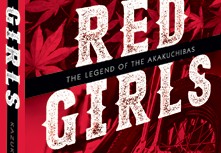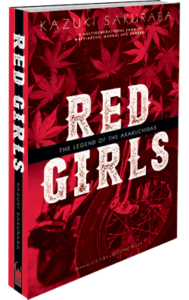I’ve read two novels now, translated to English from Japanese, that seem to form a very strange genre, or perhaps its better described as a unique way of telling the story. The best thing I can think to call them are generational stories. Here are my thoughts.
Generational Stories
Both of the stories here have the same style, one I’ve never seen before: Segmented into different parts following the different generations of a family. I suppose the main benefit of telling a story in this form is that you can build up an overall Arc of a story by smaller parts, focusing on new characters each time and connecting everything together by family ties.
Belka
The first of the generational stories I read was Belka, why don’t you bark? by Hideo Furukawa, a rather strange introduction to this style of storytelling. It follows a dog, its offspring, and then the entire (and I mean entire) family tree for the next few generations, interspersed with the tale of Russian and Japanese mafiosos.
I find that Belka quickly spiralled into a bit of an uncontrollable story, what with dogs having so many pups in each litter. I can understand that that would lead to many different tales to be told, which indeed seems to be the point of this story, but it makes it so hard to keep track of, and kind of dilutes any attachment you can make to the characters.
Belka made a fair number of its sub-stories quite a focus on military matters, covering the conflicts in the latter half of the 20th century. I just don’t find that incredibly interesting. It did then jump back and forth between the past and the present, with the present covering one singular story of a Russian hit man and his attempt to go against the Japanese Yakuza. By about half way through the book, I was a lot more interested in this 2nd story than the original one with the dogs. The two do finally link up, but the two stories seemed so disparate that I didn’t really get whatever deeper meaning there was in the connection.
The individual generational stories in Belka are not terribly connected, aside from just knowing who came from what branch of the family (and it gets quite big). A lot of them are just either dogs doing dog things, or dogs “helping” their human owners in the military and beyond – neither of these story types I found all that interesting. The stories at the start, showing how it all began was quite a good read, as were the stories about the dogs that the Russians sent in to space. Towards about a 3rd of the way in, everything started to drag on a bit though.
Red Girls
The second, far more compelling in my mind, is Red Girls: Legend of the Akakuchibas by Kazuki Sakuraba. This one starts by following the life of an abandoned child, and the life of the family she raises over the next few generations, as deciphered by one of her descendants.
In Red Girls, the fact that there are fewer people being born, in combination to having a bit more of a focus on one lineage throughout the book, is a good way to bring the madness out of this storytelling method.
Red Girls had far more compelling stories attached to the life of each of the characters that crops up, and it has far more humour as well. Everyone who is mentioned is mentioned for a reason, and has a role that directly affects the story. The storytelling in Red Girls also doesn’t jump around as much, it’s far more linear. That makes for a far better reading experience.
I also much prefer the general theme of Red Girls. No military specific focus here, though the conflicts of the 20th century do have an important impact on the characters. The big thing here is the mystery: the origin character Manyo is a clairvoyant, and by using this you get little snippets of the future here and there. On top of this, there’s a lot of dying, and the story shows how characters deal with this. There is death in Belka, but I never really engaged with it as much. Possibly because those involved in Red Girls are people, not canines, the aftermath (and to various extents precursors) of deaths have a deep impact and it’s far more engaging and possible to emphasise with.
Red Girls gets me thinking of the futility involved in life. Through the story the characters do have an impact on each other, but in the end, unless there’s a concerted effort to record anything, they’ll probably be forgotten. One of the big issues raised in the later part of the story is the very fact that as this is a retelling of you past, you can never know with any precision what actually happened.
I mention the sense of futility in Red Girls. Despite this, the story told still feels meaningful. Though each of the parts tells the life of many descendants of the family, there is a focus on one main lineage. The origin, Manyo and her troubles: being an outsider, the marriage of questionable integrity, and then having to deal with visions of those dying in the future. Then there’s one of her children, Kemari, and her story from being a gang member to how that influenced her career as an artist. And lastly, the granddaughter Toko, who starts to unravel some of the stories and mysteries surrounding her parents and grandparents.
The generation story can be a bit of a slow burn at times, but overall Red Girls does have a good story, good characters and the mystery of the story works well.
The Books
Having never encountered these kinds of stories before, it was quite an experience reading them. The whole “all the generations are connected” idea is great, and it’s a really different way of telling a story compared to the “here’s one person’s journey, and we’ll never know what happens next”. Having read two of these books (one better and one… not quite so good), it is quite apparent that some stories will lend themselves to this format more, and the author does need some restriction on how you pick and prune the family tree.
If you’re dog mad, you might well enjoy Belka, but I wouldn’t recommend it. As for Red Girls, that one is definitely worth a read, a human story that has much more real characters.
Belka, Why Don’t You Bark?, by Hideo Furukawa – Haikasoru, ISBN: 978-1-4215-4937-8
Red Girls: The Legend of the Akakuchibas, by Kazuki Sakuraba – Haikasoru, ISBN: 978-1-4215-7857-6


